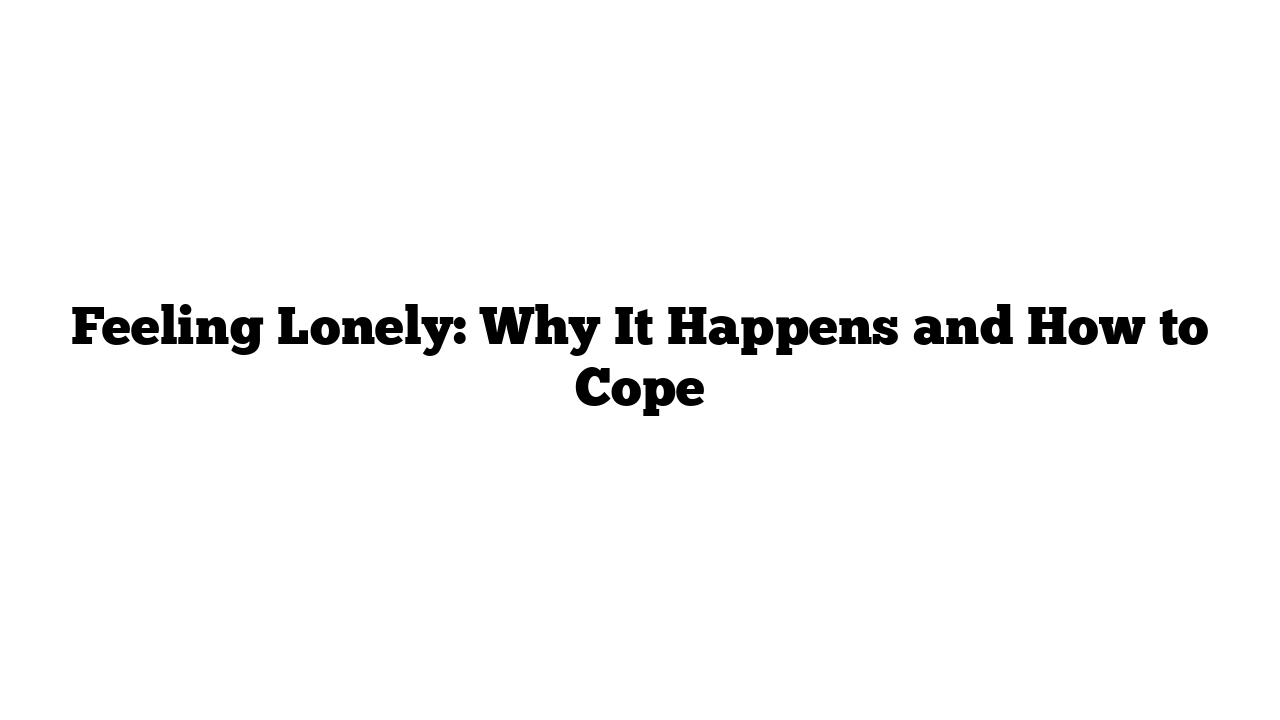Loneliness is something everyone feels from time to time. Whether you’re sitting alone at lunch, moving to a new city, or trying to find someone to hang out with on the weekend, feeling lonely is part of life. But for many in the USA, this feeling has become more common. Studies show that nearly half of Americans regularly feel lonely, even though we live in a world where it’s easier than ever to connect.
Loneliness vs. Being Alone
It’s important to know that being lonely and being alone aren’t the same thing. You can be perfectly happy by yourself or feel lonely in a room full of people. Loneliness is subjective, meaning if you feel lonely, then you are lonely. It doesn’t matter if you have lots of friends or are always surrounded by people.
There’s also a misconception that lonely people just don’t know how to socialize or behave around others. In reality, loneliness can happen to anyone. It doesn’t matter if you have great social skills or a charming personality. This is because loneliness is deeply connected to our biology.
The Science Behind Loneliness
Loneliness isn’t just an emotional feeling—it’s part of how our body works. Just like hunger reminds us to eat, loneliness pushes us to seek social connections. Our ancestors lived in small, tight-knit groups where survival depended on being part of a community. In those days, being excluded from the group meant danger, even death.
To help prevent isolation, our bodies developed “social pain,” a feeling that kicks in when we are rejected or disconnected. This feeling of rejection was crucial for survival. Early humans who felt the sting of rejection were more likely to change their behavior and stay connected to their tribe. This made them more likely to survive.
The Modern World and Loneliness
Although humans have come a long way since then, our biology remains the same. We still need close social bonds to feel safe and secure. However, the modern world has made it harder to maintain these connections.
In today’s society, we often move to new cities for work or school, leaving our social circles behind. Even with technology, face-to-face connections are becoming less common. In the USA, the average number of close friends people have has decreased over the years.
Many adults become lonely by accident. As we get older, we get busy with work, family, and even things like Netflix. Time with friends becomes less of a priority. Eventually, you may wake up one day and realize you feel isolated. Making new friends as an adult is challenging, and this can cause loneliness to become a chronic issue.
The Health Risks of Loneliness
Chronic loneliness isn’t just bad for your mood—it can have serious health effects. Studies show that long-term loneliness increases the risk of various health problems, including:
- Faster aging
- Weaker immune system
- Higher risk of Alzheimer’s
- More severe cancer outcomes
Loneliness is as dangerous as smoking a pack of cigarettes a day. The stress it causes is toxic to the body and can lead to a shorter lifespan.
Why Loneliness Feeds on Itself
One of the biggest problems with loneliness is that it often becomes a self-perpetuating cycle. When you feel lonely, your brain goes into self-defense mode. You become more sensitive to social cues, but at the same time, you start interpreting them incorrectly. This can make you feel that others are rejecting you, even if they’re not.
The more you feel rejected, the more likely you are to pull away from others, making it even harder to break free from the cycle of loneliness. This can lead to further isolation and, in severe cases, depression.
Steps to Break the Loneliness Cycle
If you’ve been feeling lonely for a long time, it’s important to recognize that loneliness is normal. Everyone feels lonely at some point in their life. Here are some steps you can take to break the cycle:
- Recognize the cycle: Understand that loneliness feeds on itself. If you’re feeling isolated, take a step back and look at your situation objectively. Are you avoiding social situations? Are you assuming people don’t want to talk to you?
- Challenge negative thoughts: Ask yourself if you’re focusing too much on negative interactions. Did your colleague really brush you off, or were they just busy? Were your friend’s comments really meant to be hurtful, or are you reading too much into it? Sometimes, it’s easy to assume the worst, but giving people the benefit of the doubt can help.
- Take small steps to reconnect: Start by saying yes to social invitations, even if you don’t feel like it. You don’t have to jump into big gatherings—just start small. Reaching out to someone you haven’t spoken to in a while can also make a big difference.
- Consider professional help: If loneliness is overwhelming, don’t hesitate to seek professional help. There’s no shame in asking for support, and therapy can be a great tool for working through difficult emotions.
Moving Forward
Loneliness is more than just a personal problem—it’s becoming a public health crisis in the USA. As a society, we’ve built a world full of technology and innovation, but none of it can replace our need for human connection. It’s time we recognize that social bonds are just as important as any other part of our well-being.
We must remember that humans are social creatures. We need each other to thrive, both physically and emotionally. So, if you’re feeling lonely, remember—you’re not alone, and it’s never too late to rebuild connections.
For further reading, check out helpful articles on Loneliness and Health and Why Loneliness Hurts.
